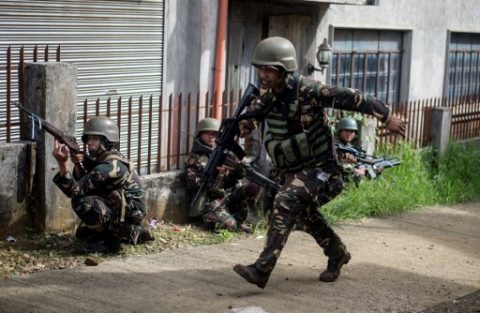
MARAWI, Philippines (AFP) — Islamist militants occupying parts of Marawi used a water route to bring in ammunition and evacuate wounded fighters, helping them withstand a five-week military offensive, the army said Tuesday.
The extremists have remained holed up in pockets of Marawi, weathering daily air and artillery bombardment and deadly urban street battles.
Military spokesman Lieutenant Colonel Jo-ar Herrera said the route was discovered following the arrest of a man who used a boat to smuggle ammunition into the battle zone and ferry wounded militants out.
The military was able to cut off the “logistical and medical highway” across Lake Lanao, he said, adding that boat patrols on the lake have been bolstered.
“We found out that this man… is the one facilitating the entry of ammunition. He is also the person bringing wounded fighters from the main battle area toward the south of Lanao Lake,” Herrera told reporters.
“This is good news because we have now blocked this highway.”
Marawi is located on the shores of Lake Lanao on Mindanao island.
Hundreds of militants attacked the city on May 23.
The government described the attack as a rebellion aimed at setting up an IS province in the area — part of what it said was an attempt to carve out a caliphate in Southeast Asia.
President Rodrigo Duterte declared martial law across Mindanao to quell the rebellion. But five weeks of fighting have failed to fully drive out the militants, who have been joined by fighters from Indonesia, Malaysia and as far away as Chechnya.
Almost 400 people have been killed, including 290 militants and 70 troops, according to official figures.
Herrera said the military was still trying to confirm reports that a key leader of the attack, veteran Filipino militant and the Abu Sayyaf’s Isnilon Hapilon, had been able to escape the military encirclement.
Up to 120 militants remain holed up in parts of four districts of Marawi, the military said, as air strikes and artillery shelling continued Tuesday.
The militants are also holding around 100 hostages, including a Roman Catholic priest they abducted early in the siege.







